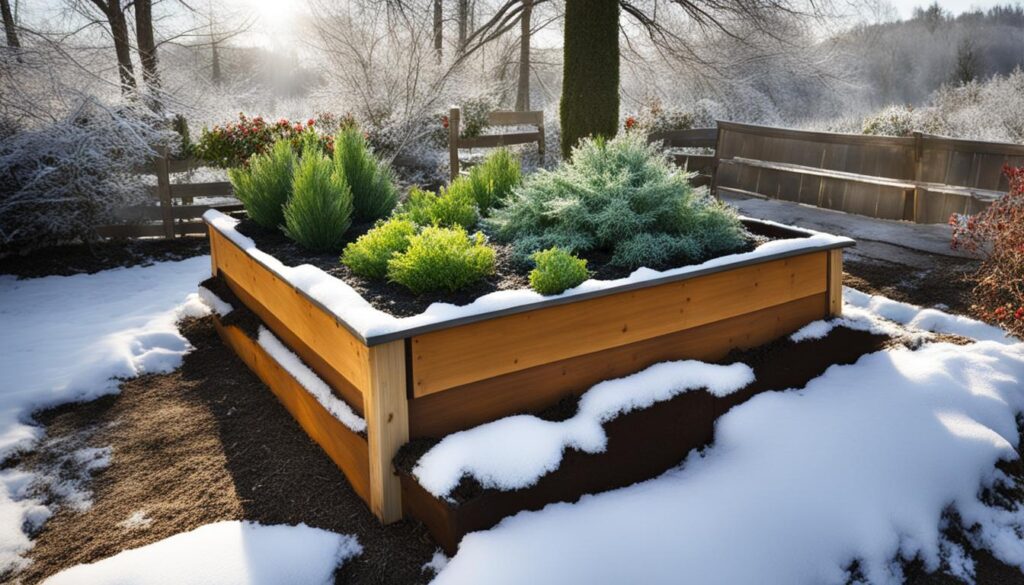When winter is on the horizon, it’s time to start thinking about how to protect your garden beds from the harsh conditions. Winterizing your garden beds is crucial to ensure the health and vitality of your plants and soil during the colder months. By taking the necessary steps to winterize garden beds, you can prepare garden beds for winter and protect plants and soil in winter.
Preparing Flower Beds for Winter
Before the first frost arrives, it’s crucial to prepare your flower beds for winter to ensure their health and vitality. By following these steps, you can safeguard your flower beds, maintain them throughout the winter, and protect your perennials.
Step 1: Remove Spent Annual Flowers
Start by removing any annual flowers that have finished blooming. This helps prevent disease and eliminates potential avenues for pests to overwinter in your garden.
Step 2: Trim Perennials and Rose Bushes
Trimming your perennials and rose bushes is essential before winter sets in. Cut back the stems and foliage to about 2-3 inches above ground level. This prevents the plants from becoming brittle and reduces the risk of damage or disease.
Step 3: Weed the Garden Bed
Before winter, take the time to remove any weeds from your flower beds. Weeds can compete with your plants for nutrients and water, so ensuring a weed-free bed helps your perennials stay healthy throughout the dormant season.
Step 4: Add Organic Matter on Top of the Soil
Adding organic matter, such as compost or well-rotted manure, on top of the soil provides several benefits. It helps retain moisture, adds nutrients, and improves soil structure. Spread a layer of organic matter about 2-3 inches thick over the garden bed.
Step 5: Plant Spring-Blooming Bulbs
Take advantage of the fall season to plant spring-blooming bulbs. Daffodils, tulips, and crocuses are excellent choices that will add vibrant colors to your flower beds once winter fades away.
Step 6: Protect Sensitive Plants
For more delicate perennials and shrubs, provide extra protection by adding an additional layer of mulch or wrapping them in burlap. This insulation guards against extreme temperature fluctuations and reduces the risk of frost damage.
By following these steps, you can ensure that your flower beds are well-prepared for winter. Your perennials will be protected, and come spring, they will reward you with beautiful blooms. Don’t forget to check out the image below showcasing a picturesque winter flower bed!
Winterizing Raised Garden Beds
Raised garden beds require special attention when it comes to preparing them for winter. These beds have looser soil and better drainage, which allows for earlier planting in the spring. To ensure the health and success of your raised beds, it’s important to take the following steps to winterize them:
- Reflect on the current season: Take a moment to evaluate what worked well in your raised beds and what didn’t. This will help you make informed decisions for the upcoming winter.
- Remove weed seeds and diseased plants: Clear out any weeds, as well as plants that are diseased or showing signs of pest infestation. This will prevent the spread of pests and diseases during winter.
- Add organic matter: Replenish the soil in your raised beds by adding organic matter such as compost or mulch. This will invigorate the soil and provide essential nutrients for the next growing season.
- Cover the beds: Protect your raised beds from weed growth and soil erosion by covering them with a layer of black plastic or cardboard.
- Consider winter cover crops: Planting cover crops like winter rye or clover can help improve the quality of your soil during the winter months.
By following these steps, you can ensure that your raised garden beds are well-prepared for winter and will be ready for a successful growing season in the spring.
Can Winterizing My Garden Bed Also Help Control Mosquitoes in My Yard?
Winterizing your garden bed can actually help control mosquitoes in your yard. By removing standing water and debris in the garden, you can eliminate potential mosquito breeding grounds. Additionally, incorporating natural yard mosquito treatment strategies such as planting mosquito-repelling plants can further deter these pesky insects.
Conclusion
Winterizing your garden beds is crucial for maintaining a healthy garden year-round. By following these winterization tips, you can ensure that your flower beds and raised garden beds are prepared for the harsh winter conditions, allowing your plants and soil to thrive when spring arrives.
First, remove any spent plants from your garden beds. This will help prevent diseases from lingering and spreading during the winter months. Additionally, the removal of old plants will make room for new growth in the coming seasons.
Next, add organic matter such as compost or mulch to your garden beds. This will provide essential nutrients to the soil and help retain moisture, ensuring that your plants have a strong foundation to grow from when the warmer weather returns.
To protect more delicate plants from the cold temperatures, consider covering them with a layer of mulch or wrapping them in burlap. This will provide an extra layer of insulation and shield them from harsh winds and freezing temperatures.
Finally, consider planting winter cover crops in your raised garden beds. These crops, such as winter rye or clover, can help improve the soil quality by fixing nitrogen and preventing erosion.
By taking these steps to winterize your garden beds, you can ensure that your plants and soil are well-protected during the winter months. With proper winter garden maintenance, you’ll be rewarded with a vibrant and healthy garden when spring arrives.










